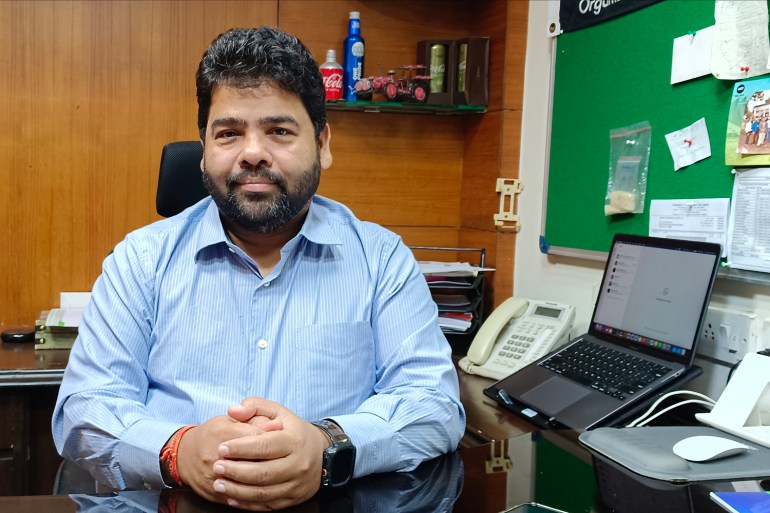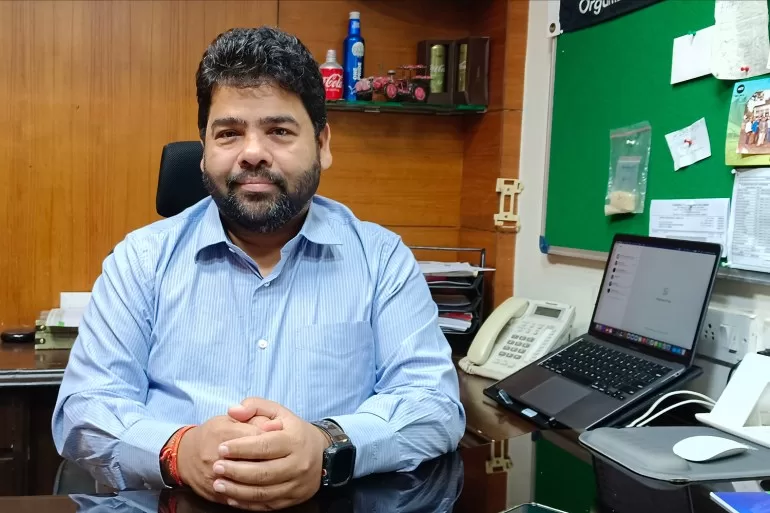Kolkata, India – Last year, Aditya Manaksia started exporting food products to Bangladesh in an attempt to expand his business.
Now, the 43-year-old Kolkata-based exporter of agro products is nervously watching the continuing political turmoil in the neighbouring country that broke out in July as a protest against job quotas and has since led to the overthrow of former Prime Minister Sheikh Hasina on August 5.
More than 300 people have lost their lives in the weeks-long mayhem that has also seen massive destruction of property.
Manaksia exported spices, coconuts and pasta worth $10,000 to Bangladesh in the financial year ending March 2024 with the hope of making good money. “I was looking to expand my business there. But all my hopes are dashed due to the political unrest. I don’t know what lies ahead. We can just pray for the situation to turn normal as soon as possible,” Manaksia told Al Jazeera.
Rajeev Goenka, a Kolkata-based entrepreneur who has an apparel manufacturing unit in Dhaka says that the current situation has hit him hard. Goenka’s Dhaka unit makes around three million garments a year, including jeans and shirts, but the production has come to a halt since July due to the protests.
He is trying to assure his European clients that they will meet deadlines, he said, but he is not certain he will be able to. “We even don’t know whether Bangladesh banks will offer Letter of Credit (LC) or not [needed for cross-border trade]. We have to wait and watch the situation and it is too early to comment on the total losses incurred because of the violence,” Goenka said.

Strong trade relations
India has strong trade relations with Bangladesh, which is among its top 10 export destinations. In the last financial year, it sold goods including textiles, tea, coffee, auto parts, electricity, agriculture, iron, steel and plastics worth $11.1bn and imported readymade garments, leather and leather products, among other items, for $1.8bn.
India’s exports were down in the last couple of years partly because of an Indian ban on exporting basmati rice in an effort to save it for domestic consumption and also because of Dhaka’s severe forex shortage which crimped its import capability, said Ajay Srivastava, Founder, Global Trade Research Initiative.
Srivastava, however, expressed hope that trade would turn normal soon. “They are a smart country and cannot ignore India because of the geographical closeness with us. The situation would soon return to normal if there is no interference from fundamentalists. Exporters should tread with caution and utilise Letter of Credit for doing any business dealings there,” Srivastava said.
One industry that is not worried about the recent turmoil in Bangladesh is the cotton traders.
Bangladesh is hugely dependent on India for raw cotton to supply its $47bn (exports) garment industry and Indian traders have said they expect to meet their export targets.
“We are aiming to export around [2.8 million] bales of cotton globally, out of which [2 million] bales will be sent to Bangladesh alone” in the 12 months ending in September, Atul Ganatra, president of the Cotton Association of India told Al Jazeera. One bale is 170kg (375 pounds).
Ajay Sahai, director general of the Federation of Indian Exports Organisations, told Al Jazeera that things are returning to normal across the border.
“The movement of trucks has resumed in some of the border areas and the situation is expected to turn normal soon. They [Bangladesh] are hugely dependent on us for daily food items and will start the imports soon as bringing the similar products from elsewhere will cost them dearly,” he pointed out.
However, despite such assurances of normalcy, Kaustav Palit, 55, who exports onions, ginger, tamarind and other perishable items to Bangladesh told Al Jazeera that the situation is tricky.
“We deal in perishable goods that have a limited shelf life. We might incur losses if our vehicles get stranded at the international border. I normally send around $100,000 of goods every year to Bangladesh. We need a complete safe passage otherwise the losses would be huge … We are extremely worried about the situation,” he explained.
‘Completely vacant now’
Small entrepreneurs in Kolkata, too, have been drastically hit by the violence.

West Bengal enjoys a close relationship with Bangladesh due to its geographical location, and similar linguistics and culinary habits. Some areas in Kolkata are known as “mini Bangladesh” for their Bangladeshi influence and for the number of Bangladeshi tourists.
Many eateries, hotels and tour and travel entrepreneurs have been named after streets in Bangladesh. These businesses, located in areas like Marquis Street and Free School Street, are fully dependent on these tourists for their business which is badly hit now.
Kingshuk Saha, 39, who runs an eatery offering Bangladeshi cuisine told Al Jazeera that he has almost lost 80 percent of his business as tourists have stopped coming. “The majority of our customers are Bangladeshi tourists who come for a holiday trip or for business work and stay in these areas,” he said.
“Our eatery remains crowded during the lunch hours, but it’s completely vacant now. We are hardly getting any customers and might soon find it difficult to clear our staff salaries. The government has also paused issuing visas due to the massive protest there. We want a stable government there as it would be helpful for our business,” he added.
The Indian visa centres in Bangladesh remain shut until further notice due to the prevailing tension.
Most of the 200 small and big budget hotels and guest houses in the area have seen occupancy levels drop to 10 percent from as high as 100 percent during Muslim holidays, Manotosh Kumar Saha, president of a local business society, told Al Jazeera
Some Bangladeshi tourists have also run out of funds as internet services were cut off in Dhaka, preventing them from transferring money. “We helped several of them financially to return to their nation. The entire business community here is in complete crisis,” Saha added.
Tour operators are also facing the heat, as fewer buses are plying between the two countries.
“We normally run seven buses carrying 28 passengers to Dhaka every day, but right now just one or two buses are running. The situation is similar for all the operators,” said Bidyut Chakraborty, a private bus operator.
Shah Alam, 46, who runs a spare car parts shop in Dhaka and is currently on a trip to Kolkata, told Al Jazeera that his staff has not been able to open his shop for the past four to five days, but he is hopeful things will soon improve.
“The shops are currently closed as no one wants to ruin their business by keeping their establishment open in such a critical time. I have been importing automobile spare parts from India for the past 10 years and have never faced any issues. The situation will improve soon in the coming days.”
